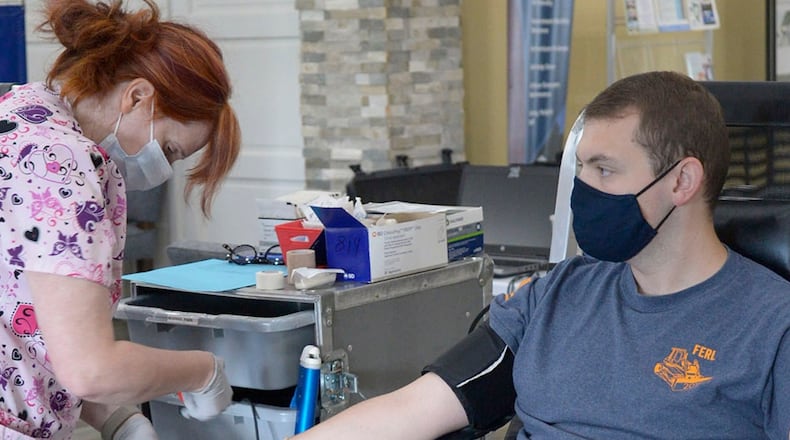Blood drives are important since the blood is used for military patients of all ages and must be available at all times.
“The blood is used for surgery, transfusions, to treat cancer patients and battlefield wounds,” Brady said. “Whole blood can also be separated into multiple components such as fresh frozen plasma and platelets. Fresh frozen plasma and platelets are used for patients who have coagulation disorders.”
Donating blood can also be helpful for COVID-19 patients, he added.
“If someone has recently been infected with COVID-19 and is fully recovered, we can potentially use their plasma to make COVID-19 convalescent plasma,” he said. “This contains the COVID-19 antibodies.”
Programs like these are helpful for military personnel and their families in peacetime and wartime, but they can also help civilians in need during humanitarian missions.
“A single pint of blood can sustain a premature infant’s life for two weeks,” Brady said. “Eight units of platelets may be required daily by leukemia patients undergoing treatment, and 40 or more units of blood may be needed for a single trauma victim.”
Brady wants people to understand the importance of donating blood.
“Whole blood cannot be synthesized or made up. We rely on donors for this literally life-saving substance,” he said.
Upcoming blood-donation events:
· Oct. 6 — Defense Supply Center Columbus (Bldg. 14/Community Center) from 10:30 a.m. to 2:30 p.m.
· Oct. 7 — National Air and Space Intelligence Center (Bldg. 859) from 9:30 a.m. to 2:30 p.m.
· Oct. 14 — Wright State University ROTC (3640 Colonel Glenn Highway) from 9:30 a.m. to 2:30 p.m.
· Oct. 18-20 — Senior NCO Blood Drive (WPAFB Blood Donor Center) from 8 a.m. to 4 p.m.
· Oct. 21 — 88th Comptroller Squadron (Bldg. 1, Room 131B) from 9:30 a.m. to 2:30 p.m.
· Oct. 27 — Air Force Security Assistance Center (Bldg. 210) from 9:30 a .m. to 2:30 p.m.
· Oct. 29 — National Museum of the U.S. Air Force (9:30 a.m. to 2:30 p.m.)
The Wright-Patterson AFB community — military, civilian, retirees, contractors and family members — can donate blood. All a donor needs to do is walk in, bring a photo ID, register, go over a few health questions, get a mini physical and then donate. The entire process takes about an hour.
While the Blood Donor Center accepts all blood types, the greatest demand is for Type O donors, 88th Medical Group officials said.
One pint of blood can help up to three people in need. However, donated red-blood cells do not last forever and only have a shelf life up to 42 days, according to the American Red Cross.
To be eligible at the WPAFB Blood Donor Center, donors must be at least 17 years old, weigh over 116 pounds, and not have a cold or other illness. Individuals may give blood every 56 days, or six times a year.
For more information about blood donations, contact the base’s Armed Services Blood Program at 937-257-0580.
About the Author

